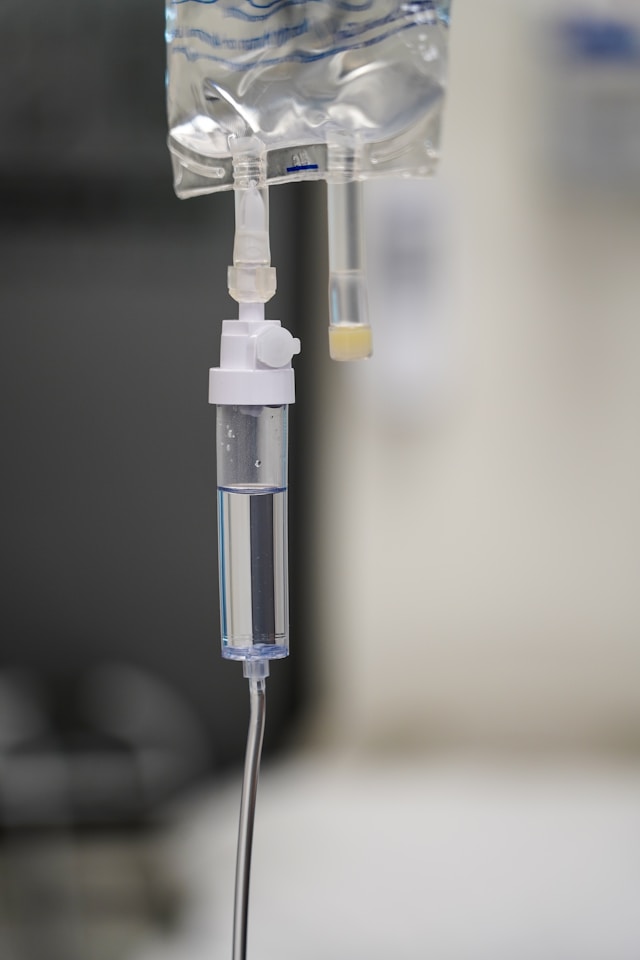
Infusion Therapy vs. Oral Medications: Key Differences Patients Should Know


Dr. Chen is a board-certified immunologist with over 15 years of experience treating autoimmune and immunodeficiency disorders. She specializes in IVIG therapy and has published extensively on immune system treatments.
Medical Disclaimer
When your doctor recommends infusion therapy, you might wonder why you can't simply take a pill instead. It's a reasonable question—oral medications are convenient, familiar, and don't require clinic visits or IV placement. However, for many conditions and medications, infusion therapy offers significant advantages that can make the difference between effective treatment and inadequate symptom control. Understanding why infusion therapy may be recommended over oral alternatives helps you appreciate the benefits and make informed decisions about your treatment.
Key Highlights
- Infusion therapy delivers 100% of the medication directly into your bloodstream, while oral medications lose significant potency through digestion and first-pass metabolism.
- Some medications—particularly large-molecule biologics—cannot survive stomach acid and are only available as infusions, making IV delivery the only effective option.
- While infusion therapy requires clinic visits, many patients find they need fewer doses than oral alternatives and experience more consistent symptom control with less frequent dosing.
How Oral Medications Work
When you swallow a pill, it travels through your digestive system where it must be broken down and absorbed. The medication passes through your stomach (where acid begins breaking it down), into your intestines (where most absorption occurs), and then through your liver (where it's metabolized) before finally reaching your bloodstream to treat your condition.
This journey significantly reduces how much active medication actually reaches your bloodstream—a process called "first-pass metabolism." Depending on the specific drug, only 20-80% of an oral medication may ultimately become available to your body. The rest is broken down or eliminated before it can work.
According to the National Institutes of Health, this reduced bioavailability isn't necessarily a problem for many medications. Oral drugs are formulated with this loss in mind, and for countless conditions, oral medications work excellently. However, for certain diseases and drug types, this limitation makes oral administration impractical or impossible.
How Infusion Therapy Works
Infusion therapy bypasses your digestive system entirely. Medication goes directly into a vein, immediately entering your bloodstream at full concentration. This is called 100% bioavailability—every bit of medication your doctor prescribes reaches your circulation to exert its therapeutic effect.
This direct delivery allows for precise dosing and predictable drug levels. Your healthcare provider knows exactly how much medication you're receiving and can accurately predict how your body will respond. There's no guesswork about whether you absorbed enough or whether food in your stomach affected absorption.
For medications that are destroyed by stomach acid or that can't pass through the intestinal lining into your bloodstream, infusion is often the only viable delivery method.
When Infusion Therapy Is Necessary
Certain situations make infusion therapy not just preferable, but medically necessary:
Large Molecule Medications: Biologic drugs like Remicade, Entyvio, and Ocrevus are large, complex proteins manufactured from living cells. These molecules are far too large to pass through your intestinal lining into your bloodstream and would be completely destroyed by stomach acid if taken orally. They simply cannot work as oral medications—infusion is the only effective delivery method.
Medications Destroyed by Digestion: Some drugs break down too quickly in the acidic stomach environment to maintain their therapeutic properties. The digestive enzymes that help you process food would also break down these medications before they could be absorbed.
Conditions Affecting Absorption: Patients with inflammatory bowel disease, short bowel syndrome, or other gastrointestinal conditions may not absorb oral medications reliably. Infusion therapy ensures they receive their full dose regardless of digestive system function.
Need for Immediate Effect: Some conditions require rapid medication delivery that oral routes cannot provide. When medication needs to work quickly, infusion offers the fastest path to therapeutic levels.
Severe Disease or Oral Medication Failure: When oral medications haven't adequately controlled symptoms, infusion therapy often represents the next step in treatment. Many patients are prescribed infusion therapy after trying multiple oral medications without sufficient benefit.
The Mayo Clinic notes that for autoimmune and inflammatory conditions, biologic infusions have transformed treatment outcomes for patients who didn't respond adequately to oral therapies.
Key Advantages of Infusion Therapy
Beyond necessity, infusion therapy offers several potential advantages over oral medications:
Complete Bioavailability: As mentioned, 100% of infused medication enters your system versus the reduced amounts absorbed from oral drugs. This often means more consistent and reliable symptom control.
Predictable Drug Levels: Healthcare providers can precisely control how much medication you receive and maintain therapeutic levels more reliably. Blood levels don't fluctuate based on whether you took medication with food, how well you absorbed it that day, or variations in your digestive system.
Less Frequent Dosing: While you must visit a clinic for infusions, many infusion medications are given every few weeks, monthly, or even every six months. This can be more convenient than remembering daily or multiple-times-daily oral medications. Missing doses isn't an issue when you're receiving treatment under medical supervision.
No Gastrointestinal Side Effects: Oral medications, particularly those for autoimmune conditions, often cause stomach upset, nausea, or other digestive problems. Infusion therapy bypasses your digestive system entirely, eliminating these specific side effects.
Professional Monitoring: Each infusion includes vital sign checks, nursing assessment, and immediate access to medical support if any issues arise. This built-in monitoring provides an extra layer of safety that self-administered oral medications don't offer.
Elimination of Absorption Variability: Factors like food intake, other medications, and individual differences in digestive function can significantly affect oral medication absorption. Infusion therapy eliminates this variability, providing consistent dosing every time.
Addressing Compliance Challenges: Some patients struggle to remember daily medications or feel overwhelmed managing complex pill schedules. Scheduled infusion appointments with healthcare supervision eliminate the adherence challenges that can undermine oral medication effectiveness.
Key Advantages of Oral Medications
While infusion therapy offers important benefits, oral medications retain advantages that make them preferable when medically appropriate:
Convenience: Taking a pill at home is undeniably more convenient than traveling to an infusion center, arranging childcare or time off work, and spending hours receiving treatment. For many people and conditions, this convenience is significant.
No Needles or IV Access: People with needle anxiety or difficult venous access may strongly prefer oral medications that don't require IV placement. There's no discomfort from IV insertion or IV site reactions.
Flexibility and Control: You can take oral medications on your schedule, adjust timing around meals or activities, and maintain more control over your treatment. You're not dependent on appointment availability or clinic schedules.
Lower Healthcare System Burden: Oral medications don't require skilled nursing time, infusion facilities, or extensive monitoring, which can reduce healthcare system costs and resource utilization.
Privacy: Taking medication at home is private, whereas infusion therapy involves healthcare facilities and staff. Some patients prefer the privacy of self-administered treatment.
Immediate Access: If your prescription runs out or you're traveling, obtaining oral medications is generally simpler than arranging infusion appointments in new locations.
According to the Cleveland Clinic, the choice between oral and infusion therapy should be based on medical necessity first, with convenience considerations factoring into decisions when multiple effective options exist.
Comparing Effectiveness
For conditions where both oral and infusion options exist, effectiveness varies by medication and individual patient response:
Inflammatory Bowel Disease: Studies comparing oral medications like mesalamine or immunomodulators to infusion biologics like Remicade or Entyvio show that many patients achieve better disease control with infusion therapy, particularly for moderate to severe disease. However, mild disease often responds well to oral medications.
Rheumatoid Arthritis: Oral disease-modifying antirheumatic drugs (DMARDs) like methotrexate work well for many patients, but those with inadequate response often achieve better outcomes with infusion biologics like Remicade or Orencia.
Multiple Sclerosis: Oral MS medications like fingolimod or teriflunomide offer convenience, but infusion therapies like Ocrevus or Tysabri often demonstrate superior efficacy in reducing relapse rates and disease progression, particularly for more active disease.
Osteoporosis: Annual infusions of Reclast offer similar or superior bone-strengthening effects compared to daily or weekly oral bisphosphonates, with the added benefit of once-yearly dosing versus frequent pill-taking.
The most effective treatment is the one that controls your specific condition while fitting into your life well enough that you can maintain it long-term.
Cost Considerations
Cost comparisons between oral and infusion therapies are complex:
Medication Costs: Infusion biologics and specialty medications are typically more expensive than oral drugs, with single infusions potentially costing thousands of dollars. However, manufacturer assistance programs, insurance coverage, and infusion center financial counseling can significantly reduce patient out-of-pocket costs.
Total Healthcare Costs: When oral medications don't adequately control disease, resulting complications, hospitalizations, and additional treatments may ultimately cost more than using more expensive but more effective infusion therapy upfront.
Insurance Coverage: Both oral and infusion medications may require prior authorization. Insurance cost-sharing structures often differ between pharmacy benefits (covering oral medications) and medical benefits (covering infusions), potentially affecting your out-of-pocket expenses.
Long-Term Value: For conditions requiring years of treatment, the most cost-effective option is often the one that best controls disease progression and prevents complications, even if per-dose costs seem higher initially.
Combination Approaches
Sometimes the answer isn't choosing between oral and infusion therapy—it's using both:
Complementary Treatment: Many patients receive infusion therapy for their primary disease control while taking oral medications for symptom management or to address other aspects of their condition.
Bridge Therapy: Oral medications might be used while waiting for insurance approval or scheduling for infusion therapy to begin.
Maintenance After Infusion: Some treatment protocols use infusions for initial intensive therapy, then transition to oral medications for maintenance once disease control is achieved.
Your healthcare provider will design a treatment plan that may incorporate both delivery methods if that optimizes your outcomes.
Making the Decision Together
The choice between oral medications and infusion therapy should be a shared decision between you and your healthcare provider, considering:
Medical Factors: Disease severity, previous treatment responses, medication options available for your specific condition, and any medical contraindications.
Lifestyle Factors: Your work schedule, ability to attend regular appointments, support system, access to infusion centers, and personal preferences.
Financial Factors: Insurance coverage, out-of-pocket costs, availability of assistance programs, and overall financial impact.
Personal Values: What matters most to you—convenience, effectiveness, avoiding needles, minimizing side effects, or other priorities.
The American College of Rheumatology emphasizes that patient preferences and quality of life considerations should be incorporated into treatment decisions alongside medical evidence.
Frequently Asked Questions
Why can't biologics be taken as pills?
Biologic medications are large, complex protein molecules that cannot survive the acidic environment of your stomach and cannot pass through your intestinal lining into your bloodstream. Stomach acid would completely break down these proteins before they could be absorbed, making them ineffective as oral medications. Infusion delivery bypasses the digestive system, allowing biologics to enter your bloodstream intact where they can exert their therapeutic effects.
Is infusion therapy more effective than oral medications?
Effectiveness depends on the specific medications being compared and your individual condition. For some diseases, certain infusion therapies demonstrate superior effectiveness compared to oral alternatives, particularly for moderate to severe disease. However, many oral medications work excellently for appropriate conditions. The "most effective" treatment is the one that adequately controls your specific condition with manageable side effects.
Can you switch from infusion to oral medication?
In some cases, yes. Some patients start with infusion therapy to achieve disease control, then transition to oral maintenance medications. Other medications are available in both infusion and self-injection forms (like Stelara), allowing switches between delivery methods. However, many infusion biologics don't have direct oral equivalents. Any switch should be carefully planned with your healthcare provider based on your disease stability and treatment goals.
Do infusion medications have fewer side effects than pills?
Not necessarily. Both oral and infusion medications can cause side effects, though the types of side effects may differ. Infusion therapy avoids gastrointestinal side effects common with oral medications, but can cause infusion reactions, fatigue, or other effects. The side effect profile depends more on the specific medication than the delivery method. Your healthcare provider will discuss expected side effects of any recommended treatment.
How often do you need infusions compared to taking daily pills?
Infusion frequency varies by medication but is typically less frequent than oral medications. Common infusion schedules include every 4-8 weeks for many biologics, every 3 months for migraine prevention, every 6 months for MS medications, or annually for osteoporosis treatment. While you must arrange clinic visits for infusions, you're not taking medication daily at home. For some patients, less frequent but scheduled appointments are easier to maintain than daily pill routines.
Both Approaches Have Important Roles
Neither infusion therapy nor oral medications are universally "better"—each has appropriate uses, advantages, and limitations. The most important factor is finding effective treatment for your specific condition that you can sustain long-term.
If your doctor recommends infusion therapy, it's likely because your condition, disease severity, or previous treatment responses make it the most appropriate choice. Understanding why infusion may be recommended helps you approach treatment with confidence rather than viewing it as an inconvenient alternative to pills.
Ready to explore your infusion therapy options? Find infusion centers near you to begin treatment that could significantly improve your disease control and quality of life.
Medical Disclaimer: This content is for educational purposes only and is not a substitute for professional medical advice, diagnosis, or treatment. Always consult your healthcare provider with questions about your medical condition or treatment options.
Article Statistics


Table of Contents
Article Statistics










